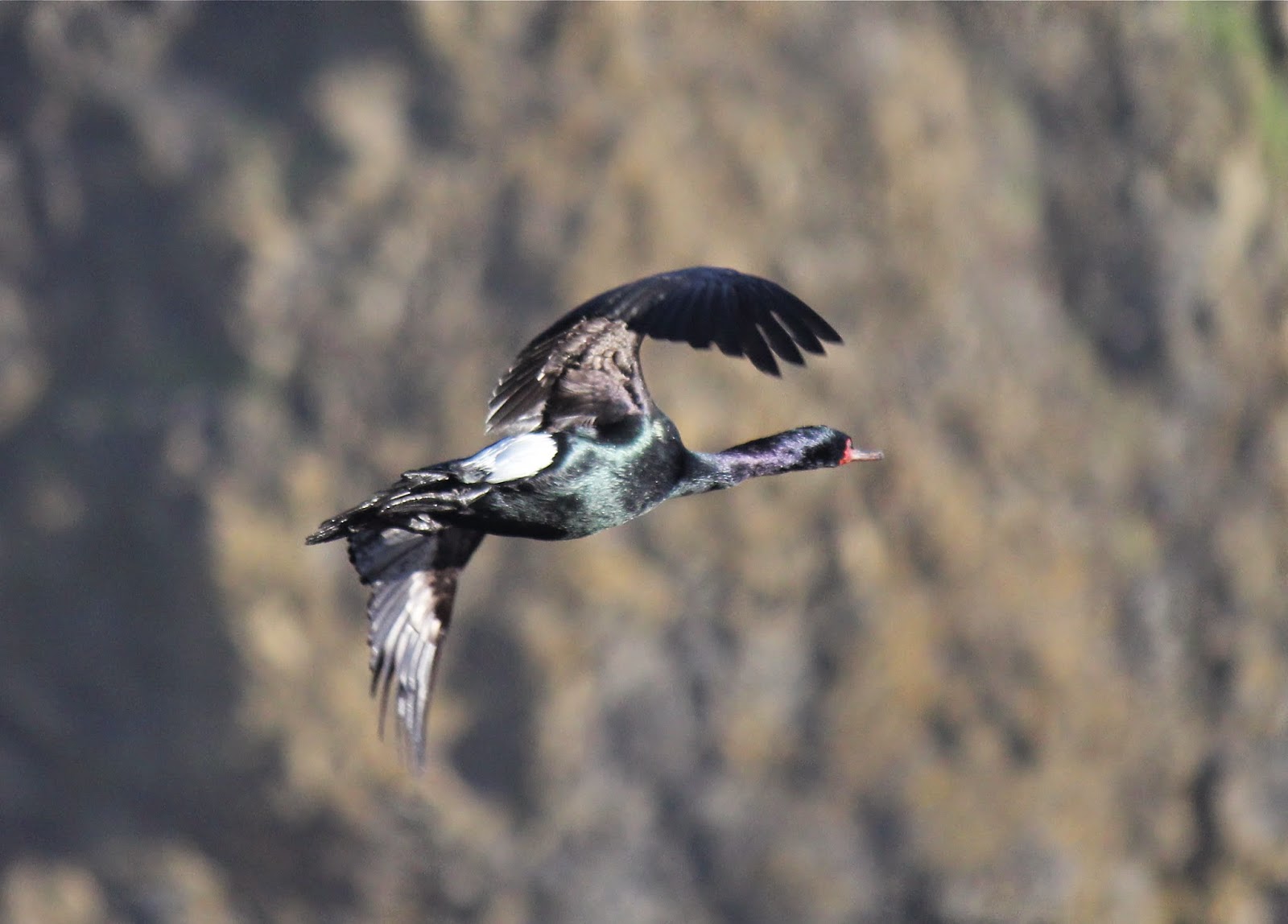May 26th to June 1st 2014
Daily Low Tides
Monday, May 26th
2.0' @ 5:34 PM
Tuesday, May 27th
-0.8' @ 6:34 AM
Wednesday, May 28th
-0.9' @ 7:18 AM
Thursday, May 29th
-0.9' @ 7:59 AM
Friday, May 30th
-0.7' @ 8:38 AM
Saturday, May 31st
-0.5' @ 9:15 AM
Sunday, June 1st
-0.1' @ 9:51 AM
Notes from the week
This week featured 5 school groups and two other non-school groups at Haystack Rock. Three groups were on the beach on Friday which featured an Aquaria station. There were also 2 additional visiting groups on Saturday. The highest count on the beach was 130 on Friday, followed closely by 117 on Saturday and 124 on Sunday.
The Black Oystercatcher nest in the saddle has eggs and the oystercatchers have started swapping 'nest duty'. On Saturday, swaps occurred at 7:20, 8:10, 9:30, and 11:00. Neal Maine was in the intertidal trying to get a pictures of the eggs, but was unsuccessful ... this time!
A harbor seal pup was spotted amongst the boulders on the south side of Haystack Rock. Mothers will leave their pups on shore while they are out foraging for food, then will come back for them. It is important for people to not disturb the pups and keep at least 50 feet away, which is the law under the Marine Mammal Protection Act. The mother will not return if there are people present. During Monday's shift, HRAP staff and volunteers monitored the pup and using signs attempted to keep the public at a safe distance. They stayed after the shift finished to continue monitoring the pup.
Creature Highlights
Birds
Invertebrates
Wednesday, May 28th
-0.9' @ 7:18 AM
Thursday, May 29th
-0.9' @ 7:59 AM
Friday, May 30th
-0.7' @ 8:38 AM
Saturday, May 31st
-0.5' @ 9:15 AM
Sunday, June 1st
-0.1' @ 9:51 AM
Notes from the week
This week featured 5 school groups and two other non-school groups at Haystack Rock. Three groups were on the beach on Friday which featured an Aquaria station. There were also 2 additional visiting groups on Saturday. The highest count on the beach was 130 on Friday, followed closely by 117 on Saturday and 124 on Sunday.
The Black Oystercatcher nest in the saddle has eggs and the oystercatchers have started swapping 'nest duty'. On Saturday, swaps occurred at 7:20, 8:10, 9:30, and 11:00. Neal Maine was in the intertidal trying to get a pictures of the eggs, but was unsuccessful ... this time!
Black Oystercatcher on the nest in 2014; Photo by Susan Glarum
Black Oystercatcher on the nest in 2014; Photo by Susan Glarum
A harbor seal pup was spotted amongst the boulders on the south side of Haystack Rock. Mothers will leave their pups on shore while they are out foraging for food, then will come back for them. It is important for people to not disturb the pups and keep at least 50 feet away, which is the law under the Marine Mammal Protection Act. The mother will not return if there are people present. During Monday's shift, HRAP staff and volunteers monitored the pup and using signs attempted to keep the public at a safe distance. They stayed after the shift finished to continue monitoring the pup.
Harbor Seal Pup on the south side of Haystack Rock
Harbor Seal Pup on the south side of Haystack Rock
Birds
- Black Oystercatchers (Haematopus bachmani) - Black oystercatcher still on their nest in the saddle.
- Bald Eagle (Haliaeetus leucocephalus) - Bald eagles, adults and juveniles, again made multiple appearances this week.
- Wandering tattler (Heteroscelus incanus) - Uncommon in Cannon Beach except during migration. This individual may still be migrating north or decide to forgo the journey this year and spend the summer here. See details on the Wandering tattler here.
- Kelp Greenling (Hexagrammos decagrammus) - a male greenling was spotted
Invertebrates
- Frosted Nudibranch (Dirona albolineata) - Normally about 1 1/2 inches, thy live on rocky shores and the low intertidal to a water depth of 100 feet. They are opaque, with projections that are edged with a fine brilliant white lien. They feed on small snails, sea anemones, sea squirts, and bryozoans.
- Shaggy Mouse Nudibranch (Aeolid papillosa) - Spotted on a north boulder with eggs
- Rufus Tipped Nudibranch (Acanthodoris nanaimoensis)
- Leopard Nudibranch (Diaulula sandiegensis)
- Pygmy Sea Cucumbers
- Hermit crab - spotted molting on Sunday
- Smooth Bay Shrimp (Crangon stylirostris) - A common species in the tide pool that buries itself in the sand. A lot of visitors stumble upon these when they are running their hands through or digging in the sand. They usually quickly rebury themselves.
- Harbor Seal (Phoca vitulina) - Very small seal pup was spotted between the large boulders on the south side. The pup was sleeping and seemed unaware of the people in the intertidal
Photos From Haystack Rock
Something we don't see often: Tufted Puffin carrying nesting material ; Photo by Susan Glarum
Frosted Nudibranch; Photo by Lisa Habecker
Wandering Tattler; Photo by Susan Glarum
Kelp Greenling; Photo by Susan Glarum
Smooth Bay Shrimp; Photo by Susan Glarum












Comments
Post a Comment